|
|
|
Sort Order |
|
|
|
Items / Page
|
|
|
|
|
|
|
| Srl | Item |
| 1 |
ID:
138267


|
|
|
|
|
| Summary/Abstract |
While devolution has provided a stronger political voice for Scotland, Wales and Northern Ireland since the late 1990s, it is only in the past few years that English public opinion appears to have become exercised by the lack of similar arrangements for England. The renewed debates over the character of the Union after the Scottish independence referendum reveal a desire for ‘fair treatment’ of England within a Union conceived as a partnership of equals. At the same time, numerous proposals have been made for devolution of power within England, reflecting long-held concerns about the territorial hegemony of London. Solutions to the former issue include English votes for English laws and an English Parliament. Solutions to the latter include city-regions, strengthened local government, the first of these appears to be the government's preferred route, in the light of the recent ‘Greater Manchester Agreement’. However, none of these ‘solutions’ can count on being implemented.
|
|
|
|
|
|
|
|
|
|
|
|
|
|
|
|
| 2 |
ID:
176085


|
|
|
|
|
| Summary/Abstract |
How is it possible to account for the continuing presence of monarchy in advanced social democracies? Much traditional political science assumes teleologically that monarchies inevitably transform into republics as a higher form of governance. This comparative study of the eight main European monarchies maintains otherwise: monarchy is perfectly compatible with democracy, and can help strengthen citizens’ loyalty to the system of government. Provided it delivers a politically impartial head of state, monarchy can endure indefinitely with government and popular support. In practice, the countries studied are de facto republics, but with hereditary heads of state who occupy social roles beyond the reach of quotidian politics. Monarchy’s principal danger is not republicanism, but the pressures of conflicting expectations about what is required of royal families, and the relentless intrusions of modern media in an age when royalty and celebrity are in danger of being conflated. Responses to Covid‐19 show how monarchs can speak to and for their nations in ways no partisan politician can.
|
|
|
|
|
|
|
|
|
|
|
|
|
|
|
|
| 3 |
ID:
096259


|
|
|
|
|
| Publication |
2010.
|
| Summary/Abstract |
The return of a hung parliament at the 2010 general election is a serious possibility. But due to Westminster's limited recent experience of parliaments under 'no overall control' there is little institutional memory in Whitehall or Westminster, and even less public understanding, of what the implications would be. This article sets out to analyse the principal challenges that would be faced by government, opposition, parliament and the media in the event of a hung parliament. Drawing on experience from Canada, New Zealand and Scotland, we discuss the difficulties that may arise during the immediate government formation process and in the course of making minority or multiparty governance work on an ongoing basis. We conclude that a hung parliament need not undermine political stability or effective governance, but that all actors would need to adapt their behaviour and should therefore prepare carefully for this eventuality.
|
|
|
|
|
|
|
|
|
|
|
|
|
|
|
|
| 4 |
ID:
155410


|
|
|
|
|
| Summary/Abstract |
The general elections of 2017 and 2010 produced hung parliaments in which no single party could command an overall majority; in May 2015 the UK only narrowly avoided that outcome. When a parliament is hung, more than one potential government can be viable, and the constitutional rules that determine who has the first right to form the government can thus have a decisive influence on which government forms. In the past, the UK has applied several potentially contradictory rules (based on conventions and principles), which do not all follow an equally democratic logic. This status quo is problematic because it can generate political controversy and uncertainty, in addition to jeopardising the Monarch's role in the government formation process. A reform that enables parliament to elect the leader who will be tasked with the formation of the next government would resolve these problems and provide constitutional clarity.
|
|
|
|
|
|
|
|
|
|
|
|
|
|
|
|
| 5 |
ID:
126190


|
|
|
|
|
|
|
|